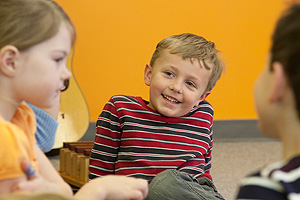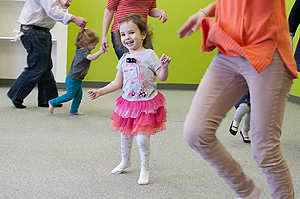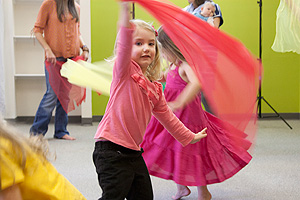Why should I pursue early childhood music education for my child?
Music awakens and stimulates neural pathways in the brain that are associated with higher forms of intelligence, such as abstract thinking, empathy, mathematics and science. Music's melodic and rhythmic patterns provide exercise for the brain and help develop memory. Remember singing the ABC song to learn your ABC's? Studying music helps children establish good listening habits, which are essential for achievement in school. Overall, music activities are perfect for child development. Music immerses the child in language, evokes movement, stimulates the brain and fosters physical coordination - all in a group setting that builds community - a holistic experience.
What does it mean when you say Musikgarten has a 9 year developmental plan for my child?
Only Musikgarten has a program that addresses the unique developmental needs of children at each age. Each of the classes are interrelated, as they were written for children to grow-up with Musikgarten. This sequential planning also makes it easier for the students to grow in their musical competence and graduate to instrument playing.
Should Parents attend and participate in the classes?
Parents are an integral part of class in the younger years. As students get older they participate by themselves, but parents take part in the classes towards the end of each lesson. For all classes, parents are asked to include active music making in their child’s life. Sing along with the CD. Play echo games, making up patterns, as we do in class. Put the picture cards or notation games on your refrigerator and play identification games with them as you get ready for dinner. More structured practice is required when the children get to Music Makers: At the Keyboard.
Why do the students get Home Materials?
Children and parents can have so much fun at home and in the car with Musikgarten songs and dances. In class you learn the songs, but at home is where you really have fun with the songs and dances. It's a great family bonding time.
As my child gets older why should I continue with music and movement training?
After being in the program for a while, you can see the benefits your child is getting from class. Research shows that singing, dancing and playing (in class and at home) is beneficial for your child's wholistic development: language, movement, math skills, and physical coordination - all in a group setting that builds community.
 Musikgarten
Musikgarten
Mommy & Me Musikgarten
Music and movement classes
Brookfield Connecticut
Music and movement classes
Brookfield Connecticut





FAQ
Frequently Asked Questions



